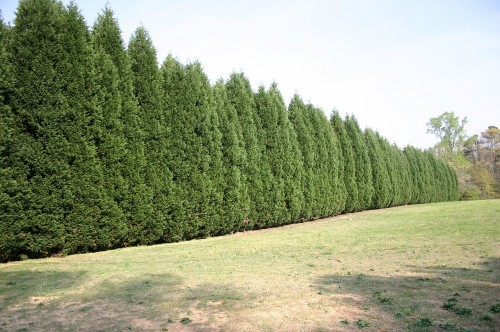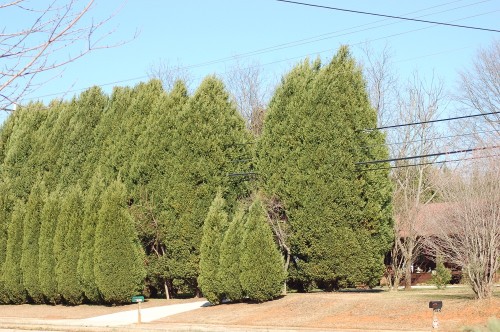





When I was a kid, we had no need for screen plants around our house. Our rural neighbors were a minimum of one hundred yards away in every direction. If they chose to put their truck up on cinderblocks in the front yard it didn’t bother us. We had disabled vehicles of our own and cinderblocks raised them just enough to get underneath and repair them, thank you very much.
We did have a fine grove of Chinese privet around our outhouse but that was to block the neighbors’ view of our personal activities, not to prevent our peering through the cracks to spy on them.
Myra D. has neighbors living closer to her than we had long ago. She writes “I would like to plant a border of trees for screening along one side of my one acre lot. My property is elevated slightly above my neighbor’s house, with a gentle slope down to their backyard. If I put up a fence it would have to be twenty feet tall. I would rather have trees and have thought about cedar. Could you recommend some trees that would grow quickly and thickly?”
When selecting a plant for screening, the first question that comes to mind is how much sunshine the site gets. Most screen plants grow fine in full sunshine but it’s tougher to find good plants for a shady site.
Lois Trigg Chaplin’s The Southern Gardener’s Book of Lists: The Best Plants for All Your Needs, Wants, and Whims notes several sun-loving evergreen trees to hide ugly views.
‘Emily Brunner’ holly
‘Nellie Stevens’ holly
‘Foster’ holly
Eastern red cedar
‘D.D. Blanchard’ magnolia
‘Little Gem’ dwarf magnolia
Virginia pine
White pine
I would add to this list
‘Green Giant’ arborvitae
‘Emerald Green’ arborvitae
Japanese cryptomeria
‘Burford’ holly
Arizona cypress
Chindo viburnum
Tea olive
‘Needlepoint’ holly
Deciduous trees
‘Slender Silhouette’ sweetgum
Prairie Sentinel hackberry
Autumn Spire maple
‘Fastigiata’ hornbeam
Leyland cypress is used ubiquitously for screening purposes but the tree has been so overused as to be derided by some landscapers. Nonetheless, if you want a fast, evergreen, opaque screen, Leyland cypress is hard to beat.
As noted above, growing screen plants in a shady site is tough. ‘Bright ‘n’ Tight’ Carolina cherrylaurel is one candidate as is American holly. Canadian hemlock is very shade-tolerant but it must have good internal soil drainage in order to prosper. If planting a hemlock, I’d add plenty of soil conditioner and sand to the planting area to make the water-hating roots happy.
The nominations above assume that you have plenty of room for the plants to expand. Joey N. writes from Midtown that he needs “an evergreen with fast, upright growth characteristics. Would Lombardy poplar do well in a tight location?”
Lombard poplar is certainly columnar. MARTA planted scores of them next to their tracks along DeKalb Avenue in the eighties to screen the train tracks. The trees grew rapidly for five years then succumbed to poplar canker, which has destroyed every Lombardy poplar I’ve ever seen. I don’t recommend the tree except for the short term.
Chaplin’s book comes to the rescue again with suggestions for Joey. She lists several columnar evergreens:
‘Spartan’ Chinese juniper
‘Skyrocket’ Rocky Mountain juniper
Italian cypress
‘Brodie’ Southern red cedar
‘Hasse’ magnolia
I also suggest
‘American Pillar’ arborvitae
‘Savannah’ holly
Weeping yaupon holly
‘Emerald Isle’ Leyland cypress
‘Woodward’ juniper
‘Scarlet’s Peak’ yaupon holly
Bamboo is occasionally used for screen but the choice often has disastrous consequences. Let me hasten to say that while it is possible to grow a bamboo screen successfully, the invasive nature of the plant must be carefully considered first. Unless a deep trench filled with metal or concrete surrounds the clump, aboveground rhizomes will spread far and wide.
If you have need for a screen, it pays to visit nurseries and ask knowledgeable plant people what has worked for them. Describe the site where the tree will grow and your height requirements. Perhaps the two of you can combine these lists with enough practical knowledge to keep the views of you and your neighbor private.
MORE INFORMATION
Landscape Plants for Georgia
Native Shade Trees


Copyright © www.100flowers.win Botanic Garden All Rights Reserved